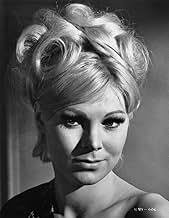AVALIAÇÃO DA IMDb
4,8/10
576
SUA AVALIAÇÃO
Adicionar um enredo no seu idiomaA TV talk-show host who may have killed his wife finds himself being pursued by both the police and a gang of hoods.A TV talk-show host who may have killed his wife finds himself being pursued by both the police and a gang of hoods.A TV talk-show host who may have killed his wife finds himself being pursued by both the police and a gang of hoods.
- Direção
- Roteiristas
- Artistas
- Indicado a 1 Oscar
- 1 vitória e 1 indicação no total
J.D. Cannon
- Walt Leznicki
- (as J. D. Cannon)
Hal K. Dawson
- Apartment House Guard
- (não creditado)
Richard Derr
- Jack Hale
- (não creditado)
- Direção
- Roteiristas
- Elenco e equipe completos
- Produção, bilheteria e muito mais no IMDbPro
Avaliações em destaque
This has every appearance of a mid-1960s contemporary television drama, filmed on 1960s television studio sets, using 1960s television lighting, using 1960s television music, with overskilled movie actors for the roles they're given. I expect an epilogue announcing "this is a quinn-martin production."
t
Janet Leigh's 1940 noir moll dialogue is ludicrous almost to the point of spoof.
Eleanor Parker's portrayal is grotesque, indulgent, and minimally watchable.
There are some interesting police procedural tidbits, almost lifted from Dragnet. J.D. Cannon is great as a Joe Friday with anger issues.
The two stars, Whitman and Leigh, seemed to take a mini-vacation from acting. They're both easy to watch, but seem distracted or tired or like they're donating their time for free. I don't know what the norman mailer novel was like, but I hope to god it wasn't like this movie.
The two stars, Whitman and Leigh, seemed to take a mini-vacation from acting. They're both easy to watch, but seem distracted or tired or like they're donating their time for free. I don't know what the norman mailer novel was like, but I hope to god it wasn't like this movie.
The film was ridiculous but that theme song will live forever. A Time for Love, by Johnny Mandel, has an unforgettable melody and Mandel's arrangement, playing over the opening credits, was the best part of the movie. Vidal Sassoon also gets special mention for Janet Leigh's chic hairstyle. The pacing and direction were so weak, I lost interest early on. I was hoping the movie would be good but it wasn't. The five stars go to Johnny Mandel. The rest of the movie deserves a big fat zero.
I watched this film for the first time today, having avoided it since its release. Mailer wrote the book, Janet Leigh is in it, so can it REALLY be as bad as all that? Oh gee . . . Eleanor Parker opens the "action" with a performance that beggars description. She acts demented, if not possessed. In the context of the film, it is impossible to believe she did not manifest bizarre behavior, such that suicide would be deemed unthinkable. Then there's the unexpected involvement of the mob boss as the film veers away from a police procedural into film noir. And then comes the whole religious prohibition against abortion and suicide, but by that point . . . Who cares? This is not one of those films which are so bad they are good. This is just bad.
War hero Stephen Richard Rojack (Stuart Whitman) is a call-in TV show host. He's on a rampage against mob boss Ganucci. He's separated from his violent drunk wife. She comes at him with a bottle and he almost chokes her. She falls off the balcony to her death. Only the sexy maid Ruta is in the apartment and he is taken in by the police. It just so happens that Uncle Ganucci's car run over the wife after her fall. Rojack's former lover Cherry McMahon (Janet Leigh) happens to be in the car also.
I'm mostly interested in this for being a Norman Mailer novel. It starts with an interesting premise until the story conveniently has Ganucci's car run over the body. It's a bad contrivance that takes me out of the movie. This could have been a tense crime drama. Instead, it's stuck in melodrama. Even the acting is stuck. There is a lack of action after the incident. Even the ledge scenes lack the intensity of normal vertigo. There are loads of turns but non of it is compelling. It's hard to care about Rojack's life or his dilemma.
I'm mostly interested in this for being a Norman Mailer novel. It starts with an interesting premise until the story conveniently has Ganucci's car run over the body. It's a bad contrivance that takes me out of the movie. This could have been a tense crime drama. Instead, it's stuck in melodrama. Even the acting is stuck. There is a lack of action after the incident. Even the ledge scenes lack the intensity of normal vertigo. There are loads of turns but non of it is compelling. It's hard to care about Rojack's life or his dilemma.
A Norman Mailer novel gets filmed as if it's a Harold Robbins story. I knew I was in for a campy treat from the opening scenes, featuring Eleanor Parker as the rich, alcoholic harpy Deborah, rolling naked on silk sheets (the camera very careful not to show any naughty bits), demanding whiskey refills from her hunky bed partner with impudent hand gestures and burning his hand with a cigarette when he tries to initiate sex. "Later!" she barks, eyes glued to the TV, watching her husband Rojack (Stuart Whitman), the host of a controversial call-in show. Parker's high-rise wallow is so arresting that Rojack's accusations that the LAPD has a protection deal with a notorious Mafia kingpin hardly register. The action ramps up when Rojack visits his estranged wife. Parker, also in the notorious show biz howler "The Oscar" the same year this was released, goes for broke and over the top, hurling cutting insults and highballs at her square-jawed husband. As Rojack, Whitman stoically endures Deborah's rant until she pantomimes castrating him, and then all hell breaks loose. Rojack finally walks out, but barely makes it to the front door before he's confronted by Deborah's sexy maid (Susan Denberg), wrapped only in a towel but willing to drop it for her boss's husband. Rojack sidesteps the seduction, but in this movie that's actually the wrong decision. Returning to his wife's bedroom for his wallet, another mêlée ensues that ends with Deborah falling off the penthouse terrace, where she's immediately run over by a limo transporting the very same Mafia kingpin Rojack accused of being in bed—figuratively, of course—with the police.
Once Parker's out of the picture "An American Dream" becomes a little less interesting, though a few actors try to match her scenery chewing, J.D. Cannon as a hot-tempered cop chief among them. Janet Leigh as Cherry McMahon, Rojack's former flame prior to his marrying Deborah and now a singer/Mafia moll, does a lot of glaring and glowering. As many other reviewers have pointed out, this often looks like a TV movie, with much of the action happening in flatly lit, claustrophobic sets (though lushly photographed). As tacky as this movie is, the novel's story actually has been sanitized for the protection of 1966 audiences. Mailer's misogyny—the one quality he shared with hack Robbins—is left well intact, however. In "An American Dream," women are just bitches and/or hos.
Though not quite in the same league as other trash-tastic movies of the 1960s, fans of "The Carpetbaggers," "Valley of the Dolls," or the aforementioned "The Oscar," will want to be sure to catch "An American Dream." Fans of Norman Mailer are best advised to skip it.
Once Parker's out of the picture "An American Dream" becomes a little less interesting, though a few actors try to match her scenery chewing, J.D. Cannon as a hot-tempered cop chief among them. Janet Leigh as Cherry McMahon, Rojack's former flame prior to his marrying Deborah and now a singer/Mafia moll, does a lot of glaring and glowering. As many other reviewers have pointed out, this often looks like a TV movie, with much of the action happening in flatly lit, claustrophobic sets (though lushly photographed). As tacky as this movie is, the novel's story actually has been sanitized for the protection of 1966 audiences. Mailer's misogyny—the one quality he shared with hack Robbins—is left well intact, however. In "An American Dream," women are just bitches and/or hos.
Though not quite in the same league as other trash-tastic movies of the 1960s, fans of "The Carpetbaggers," "Valley of the Dolls," or the aforementioned "The Oscar," will want to be sure to catch "An American Dream." Fans of Norman Mailer are best advised to skip it.
Você sabia?
- CuriosidadesDirector Robert Gist had a small acting role in the 1958 film adaptation of Norman Mailer's novel, A Morte Tem Seu Preço (1958). "An American Dream" and Mailer's own adaptation of A Marca do Passado (1987) have been the only other Mailer novels filmed to date, though a number of other films have been based on Mailer's nonfiction books.
- Erros de gravaçãoThe wall calendar inside Lt. Roberts' office is for January 1959 while the wall calendar just outside his door is for September 1963.
- Citações
Stephen Rojack: I want a divorce.
Deborah Rojack: From the daughter of the eighth richest man in the whole U.S.? Bitch I am but rich I am.
Stephen Rojack: Tired I am. The war's over.
- ConexõesFeatured in Norman Mailer: The American (2010)
- Trilhas sonorasA Time for Love
Music by Johnny Mandel
Lyrics by Paul Francis Webster
Performed by Janet Leigh (uncredited), dubbed by Jackie Ward (uncredited)
[Cherry performs the song in her club act]
Principais escolhas
Faça login para avaliar e ver a lista de recomendações personalizadas
- How long is An American Dream?Fornecido pela Alexa
Detalhes
- Data de lançamento
- País de origem
- Idioma
- Também conhecido como
- See You in Hell, Darling
- Locações de filme
- 1430 Wright Street, Los Angeles, Califórnia, EUA(As the Castle Motel, Cherry McMahon's apartment building.)
- Empresa de produção
- Consulte mais créditos da empresa na IMDbPro
- Tempo de duração
- 1 h 43 min(103 min)
- Mixagem de som
- Proporção
- 1.85 : 1
Contribua para esta página
Sugerir uma alteração ou adicionar conteúdo ausente






































